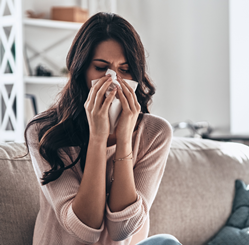
Allergies affect 65% of people’s lives in a negative way, out of which 49% of people say they miss work or school, and more than 60% of people with allergies using over-the-counter medications.
Nocturnal vestibular immunotherapy is simple, short, effective, accessible and cost effective. It lends itself to be used by allergists, ENTs and primary care providers, even in remote areas, and will enable high-risk populations to have access to immunotherapy.
TAMPA BAY, Fla. (PRWEB)
February 21, 2022
Allergy season is on its way and that is terrible news for the more than 50 million Americans suffering from allergies.(1) Typical allergy symptoms include coughing, sneezing, hives, rash, itchy eyes, runny nose, or a scratchy throat.(1) But for others, allergy symptoms negatively affect quality of life and cause immense health issues including low blood pressure, breathing trouble, asthma attacks and even death.(1) Allergy treatments cost more than $18 billion annually in the U.S.(1) The 2022 allergy season, which runs from March to October, is expected to be as bad or worse than 2021, according to Roberto Garcia, MD, allergist and founder of The Allergi Group, who indicates that there is a new patented treatment that is safer, convenient and effective for allergy sufferers.
“Climate change carries some of the blame for bad allergy seasons. The plants that are producing more pollen are directly correlated with the CO2 content of the atmosphere,” says Garcia. “For example, ragweed is not only producing more pollen than in the past, but the content of the allergen in the pollen is higher.”
Allergies Hinder Quality of Life
Allergies affect 65% of people’s lives in a negative way.(2) As a result of allergy symptoms, 49% of people say they miss work or school.(2) More than 60% of people with allergies use over-the-counter medications.(2) The most common are antihistamines such as Zyrtec or Allegra, nasal sprays, eye drops, decongestants, sinus rinses, natural remedies, or allergy shots. More than one-third of people with allergies cannot afford their medications because their insurance does not cover them.(2)
Rural and underserved communities have been notoriously neglected, not only for allergies but for medical treatment. Living in urban areas can expose people to air pollution from factories, freeways, or garbage dumps. Underserved poor populations may live in older buildings that worsen allergy symptoms. In rural areas, access to treatment is limited because “more allergy and immunology practices tend to be skewed toward coastal and large metropolitan areas,” says Garcia. People with allergies may not have transportation or time off from work to travel to their allergist for their shots one or more times per week.
“Any allergic illness is more intense in the poor population than in the population that has means,” says Garcia. “For them to be confronted with the protocol of allergy shots is nightmarish.”
The Solution is in the Drops
The solution, notes, Dr. Garcia, is to develop therapies such as nocturnal vestibular immunotherapy that require as few as three medical visits. The vestibular area of the mouth (the area between the cheeks and the teeth) has the “highest concentration of cells that pick up the drops to deliver them to the immune system,” says Dr. Garcia. Additionally, maximizing the body’s own ability to repair itself to work hand in hand with such therapies can allow allergy sufferers to find relief—medical and economical—in less time. Using drops applied in the vestibular area of the mouth (between the cheeks and gums), these therapies would require just three office visits for evaluation. Allergists could create serums based on the allergies the patient tested positive for in the office. The patients would administer their own treatment at home, along with a follow up visit every three months, thus saving money and time.
According to Dr. Garcia, he and his colleagues compared the efficacy of subcutaneous immunotherapy (i.e., allergy shots) to Nocturnal Vestibular Immunotherapy (NOVIT). There was significant symptom resolution at 24 weeks in the group of patients receiving NOVIT vs. the group receiving subcutaneous immunotherapy. Additionally, Dr. Garcia explains, there is evidence showing patients heal more efficiently when the treatment is administered at bedtime. He looked at the circadian cycle of the immune system. It is the ideal moment to immunize a person because of the circadian changes in the immune system. Furthermore, the sleep hormones potentiate the interphase of the immune cells at the lymph node.
“Nocturnal vestibular immunotherapy is simple, short, effective, accessible and cost effective,” says Dr. Roberto Garcia. “It lends itself to be used by allergists, ENTs and primary care providers, even in remote areas, and will enable high-risk populations to have access to immunotherapy.”
About the Allergi Group:
The Allergi Group has been providing care to patients ranging from infancy to adulthood for 35 years. They specialize in diagnosis and treatment of respiratory allergies, skin allergies—including hives and eczema, food, insect and drug allergies—and immune deficiencies causing recurrent infections. Dr. Roberto Garcia developed a unique treatment protocol, Nocturnal Vestibular Immunotherapy, drops that are applied sublingually at bedtime, which uses the body’s own self-repair cycle to allow better treatment and quicker results—weeks instead of months.
1. Asthma and Allergy Foundation of America; “Allergy Facts and Figures”; aafa.org/allergy-facts/
2. McNair, Kamaron; Seasonal Allergies Cost $16,000 Over a Lifetime”; 17 May 2021; ValuePenguin; valuepenguin.com/seasonal-allergies-cost-consumer
Share article on social media or email:

